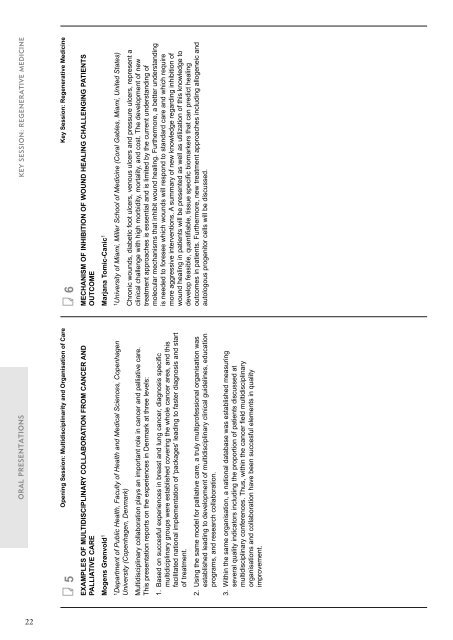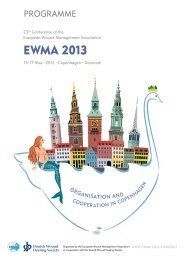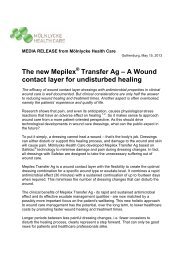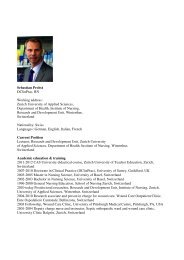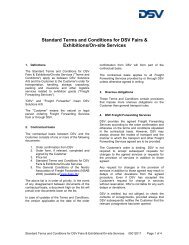- Page 1 and 2: Volume 13 Number 1 April 2013 Publi
- Page 3 and 4: European Wound Management Associati
- Page 5 and 6: Dear Participant We are pleased to
- Page 7 and 8: EWMA DOCUMENTS EWMA publications in
- Page 9 and 10: 24 th EWMA·GNEAUPP Conference of t
- Page 11 and 12: About EWMA The European Wound Manag
- Page 13 and 14: 11th Scientific Meeting of the 2nd
- Page 15 and 16: Oral Presentations Overview Bold =
- Page 17 and 18: 71 PRESSURE TIME INTEGRAL OF COMPRE
- Page 19 and 20: 148 149 DOES THE TREATMENT OF LEG U
- Page 21 and 22: ORAL PRESENTATIONS Where ever the C
- Page 23: OPENING SESSION: MULTIDISCIPLINARIT
- Page 27 and 28: FREE PAPER SESSION: LEG ULCERS I Fr
- Page 29 and 30: FREE PAPER SESSION: INFECTION Free
- Page 31 and 32: Free Paper Session: Infection 19 As
- Page 33 and 34: EPUAP Guest Session: Support Surfac
- Page 35 and 36: FREE PAPER SESSION: DRESSINGS AND W
- Page 37 and 38: Free Paper Session: Dressings and W
- Page 39 and 40: FREE PAPER SESSION: QUALITY OF LIFE
- Page 41 and 42: FREE PAPER SESSION: QUALITY OF LIFE
- Page 43 and 44: FREE PAPER SESSION: EDUCATION Free
- Page 45 and 46: Key Session: Improving Patient Safe
- Page 47 and 48: FREE PAPER SESSION: E-HEALTH AND HO
- Page 49 and 50: FREE PAPER SESSION: E-HEALTH AND HO
- Page 51 and 52: FREE PAPER SESSION: E-HEALTH AND HO
- Page 53 and 54: 64 E-learning for medical students
- Page 55 and 56: Free Paper Session: Devices and Int
- Page 57 and 58: 72 EFFECTIVENESS OF AN ACELLULAR SY
- Page 59 and 60: FREE PAPER SESSION: ACUTE WOUNDS Fr
- Page 61 and 62: Free Paper Session: Acute Wounds 79
- Page 63 and 64: 84 Free Paper Session: Leg ulcers I
- Page 65 and 66: FREE PAPER SESSION: PRESSURE ULCERS
- Page 67 and 68: FREE PAPER SESSION: PRESSURE ULCERS
- Page 69 and 70: ETRS GUEST SESSION: WOUND HEALING A
- Page 71 and 72: WORKSHOP: MEET THE EXPERTS IN MAGGO
- Page 73 and 74: KEY SESSION: NUTRITION IN WOUND CAR
- Page 75 and 76:
◄ Transcutaneous oxygen pressure
- Page 77 and 78:
KEY SESSION: E-HEALTH AND THE FUTUR
- Page 79 and 80:
EWMA UCM LECTURE Key Session: E-hea
- Page 81 and 82:
FREE PAPER SESSION: ANTIMICROBAL AN
- Page 83 and 84:
FREE PAPER SESSION: LEG ULCERS III
- Page 85 and 86:
FREE PAPER SESSION: LEG ULCERS III
- Page 87 and 88:
FREE PAPER SESSION: DIABETIC FOOT I
- Page 89 and 90:
FREE PAPER SESSION: MISCELLANEOUS F
- Page 91 and 92:
FREE PAPER SESSION: MISCELLANEOUS F
- Page 93 and 94:
FREE PAPER SESSION: BASIC SCIENCE A
- Page 95 and 96:
FREE PAPER SESSION: PRESSURE ULCERS
- Page 97 and 98:
FREE PAPER SESSION: PRESSURE ULCERS
- Page 99 and 100:
FREE PAPER SESSION: DIABETIC FOOT I
- Page 101 and 102:
Key Session: What is Good Evidence
- Page 103 and 104:
KEY SESSION: LEG ULCER Key Session:
- Page 105 and 106:
FREE PAPER SESSION: NEGATIVE PRESSU
- Page 107 and 108:
Free Paper Session: Negative Pressu
- Page 109 and 110:
RUSSIAN SPEAKING SYMPOSIUM: FREE PA
- Page 111 and 112:
RUSSIAN SPEAKING SYMPOSIUM: FREE PA
- Page 113 and 114:
RUSSIAN SPEAKING SYMPOSIUM: FREE PA
- Page 115 and 116:
RUSSIAN SPEAKING SYMPOSIUM: FREE PA
- Page 117 and 118:
RUSSIAN SPEAKING SYMPOSIUM: FREE PA
- Page 119 and 120:
Russian Speaking Symposium: Fre
- Page 121 and 122:
P224 The role of protein kinase c (
- Page 123 and 124:
P291 New wound dressing combining a
- Page 125 and 126:
P366 Compression bandaging Stanisla
- Page 127 and 128:
POSTER PRESENTATIONS Wherever a bra
- Page 129 and 130:
POSTER: ACUTE WOUNDS Poster: Acute
- Page 131 and 132:
Poster: Acute Wounds P 200 Circumfe
- Page 133 and 134:
POSTER: ACUTE WOUNDS Poster: Acute
- Page 135 and 136:
POSTER: BASIC SCIENCE Poster: Basic
- Page 137 and 138:
Poster: Basic Science P 212 THE PRO
- Page 139 and 140:
POSTER: BASIC SCIENCE Poster: Basic
- Page 141 and 142:
POSTER: BASIC SCIENCE Poster: Basic
- Page 143 and 144:
Poster: Basic Science P 224 THE ROL
- Page 145 and 146:
Poster: Devices & Intervention P 22
- Page 147 and 148:
POSTER: DEVICES & INTERVENTION Post
- Page 149 and 150:
POSTER: DEVICES & INTERVENTION Post
- Page 151 and 152:
POSTER: DEVICES & INTERVENTION Post
- Page 153 and 154:
POSTER: DEVICES & INTERVENTION Post
- Page 155 and 156:
POSTER: DIABETIC FOOT Poster: Devic
- Page 157 and 158:
POSTER: DRESSINGS Poster: Diabetic
- Page 159 and 160:
POSTER: DRESSINGS Poster: Dressings
- Page 161 and 162:
Poster: Dressings POSTER: DRESSINGS
- Page 163 and 164:
POSTER: DRESSINGS Poster: Dressings
- Page 165 and 166:
POSTER: DRESSINGS Poster: Dressings
- Page 167 and 168:
POSTER: DRESSINGS Poster: Dressings
- Page 169 and 170:
Poster: Dressings P 276 THE USE OF
- Page 171 and 172:
P 281 Poster: Dressings A NOVEL QUA
- Page 173 and 174:
POSTER: DRESSINGS Poster: Dressings
- Page 175 and 176:
POSTER: DRESSINGS Poster: Dressings
- Page 177 and 178:
POSTER: EDUCATION Poster: Dressings
- Page 179 and 180:
POSTER: EDUCATION Poster: Education
- Page 181 and 182:
POSTER: EDUCATION Poster: Education
- Page 183 and 184:
POSTER: HEALTH ECONOMICS & OUTCOME
- Page 185 and 186:
Poster: Infection P 307 PERIODONTAL
- Page 187 and 188:
P 312 Management of topical infecte
- Page 189 and 190:
POSTER: LEG ULCER Poster: Leg Ulcer
- Page 191 and 192:
POSTER: LEG ULCER Poster: Leg Ulcer
- Page 193 and 194:
POSTER: PAIN Poster: Pain P 323 Acu
- Page 195 and 196:
POSTER: PRESSURE ULCER Poster: Pres
- Page 197 and 198:
POSTER: PRESSURE ULCER Poster: Pres
- Page 199 and 200:
P 336 CLINICAL AND COST EFFECTIVENE
- Page 201 and 202:
POSTER: PREVENTION Poster: Preventi
- Page 203 and 204:
POSTER: QUALITY OF LIFE Poster: Qua
- Page 205 and 206:
POSTER: WOUND ASSESSMENT Poster: Wo
- Page 207 and 208:
POSTER: CASE STUDY Poster: Case Stu
- Page 209 and 210:
POSTER: CASE STUDY Poster: Case Stu
- Page 211 and 212:
POSTER: CASE STUDY Poster: Case Stu
- Page 213 and 214:
POSTER: CASE STUDY Poster: Case Stu
- Page 215 and 216:
POSTER: CASE STUDY Poster: Case Stu
- Page 217 and 218:
POSTER: CASE STUDY Poster: Case Stu
- Page 219 and 220:
POSTER: CASE STUDY Poster: Case Stu
- Page 221 and 222:
POSTER: CASE STUDY Poster: Case Stu
- Page 223 and 224:
POSTER: CASE STUDY Poster: Case Stu
- Page 225 and 226:
POSTER: CASE STUDY Poster: Case Stu
- Page 227 and 228:
POSTER: CASE STUDY Poster: Case Stu
- Page 229 and 230:
POSTER: CASE STUDY Poster: Case Stu
- Page 231 and 232:
POSTER: CASE STUDY Poster: Case Stu
- Page 233 and 234:
POSTER: CASE STUDY Poster: Case Stu
- Page 235 and 236:
Poster: Case Study POSTER: CASE STU
- Page 237 and 238:
POSTER: CASE STUDY Poster: Case Stu
- Page 239 and 240:
POSTER: CASE STUDY Poster: Case Stu
- Page 241 and 242:
POSTER: CASE STUDY Poster: Case Stu
- Page 243 and 244:
POSTER: CASE STUDY Poster: Case Stu
- Page 245 and 246:
POSTER: PROFESSIONAL COMMUNICATION
- Page 247 and 248:
EP463 The Use of Topical Oxygen in
- Page 249 and 250:
EP536 Are the pressure ulcers the m
- Page 251 and 252:
EP E-POSTER PRESENTATIONS Wherever
- Page 253 and 254:
E-POSTER: ACUTE WOUNDS E-Poster: Ac
- Page 255 and 256:
E-POSTER: ACUTE WOUNDS E-Poster: Ac
- Page 257 and 258:
EP 439 E-Poster: Acute Wounds E-Pos
- Page 259 and 260:
EP 443 DETERMINATION OF THE FLUID H
- Page 261 and 262:
E-POSTER: DEVICES & INTERVENTION E-
- Page 263 and 264:
E-POSTER: DEVICES & INTERVENTION E-
- Page 265 and 266:
E-POSTER: DEVICES & INTERVENTION E-
- Page 267 and 268:
E-POSTER: DIABETIC FOOT E-Poster: D
- Page 269 and 270:
E-POSTER: DIABETIC FOOT E-Poster: D
- Page 271 and 272:
E-POSTER: DIABETIC FOOT E-Poster: D
- Page 273 and 274:
EP 471 IN VITRO ASSESSMENT OF THE E
- Page 275 and 276:
E-POSTER: DRESSINGS E-Poster: Dress
- Page 277 and 278:
E-POSTER: DRESSINGS E-Poster: Dress
- Page 279 and 280:
E-POSTER: DRESSINGS E-Poster: Dress
- Page 281 and 282:
E-POSTER: DRESSINGS E-Poster: Dress
- Page 283 and 284:
E-POSTER: DRESSINGS E-Poster: Dress
- Page 285 and 286:
E-POSTER: EDUCATION E-Poster: Educa
- Page 287 and 288:
E-POSTER: EDUCATION E-Poster: Educa
- Page 289 and 290:
E-POSTER: HEALTH ECONOMICS & OUTCOM
- Page 291 and 292:
E-POSTER: INFECTION E-Poster: Healt
- Page 293 and 294:
E-POSTER: LEG ULCER E-Poster: Infec
- Page 295 and 296:
E-POSTER: LEG ULCER E-Poster: Leg U
- Page 297 and 298:
E-POSTER: LEG ULCER E-Poster: Leg U
- Page 299 and 300:
E-POSTER: LEG ULCER E-Poster: Leg U
- Page 301 and 302:
E-POSTER: LEG ULCER E-Poster: Leg U
- Page 303 and 304:
E-Poster: Pain EP 530 A TOPICAL THE
- Page 305 and 306:
E-POSTER: PRESSURE ULCER E-Poster:
- Page 307 and 308:
E-POSTER: QUALITY OF LIFE E-Poster:
- Page 309 and 310:
E-POSTER: WOUND ASSESSMENT E-Poster
- Page 311 and 312:
E-Poster: Wound Assessment EP 546 T
- Page 313 and 314:
E-Poster: Wound Assessment EP 550 D
- Page 315 and 316:
E-POSTER: CASE STUDY E-Poster: Case
- Page 317 and 318:
E-POSTER: CASE STUDY E-Poster: Case
- Page 319 and 320:
E-POSTER: CASE STUDY E-Poster: Case
- Page 321 and 322:
E-POSTER: CASE STUDY E-Poster: Case
- Page 323 and 324:
E-POSTER: CASE STUDY E-Poster: Case
- Page 325 and 326:
E-POSTER: CASE STUDY E-Poster: Case
- Page 327 and 328:
E-POSTER: CASE STUDY E-Poster: Case
- Page 329 and 330:
E-POSTER: CASE STUDY E-Poster: Case
- Page 331 and 332:
E-POSTER: CASE STUDY E-Poster: Case
- Page 333 and 334:
POSTER: CASE STUDY E-Poster: Case S
- Page 335 and 336:
Budkevich, Liudmila P382, EP433, EP
- Page 337 and 338:
Huisman, Kasia P385 Kambouris, Mano
- Page 339 and 340:
Oliveira, Andreia Cristine Deneluz
- Page 341:
van den Wijngaard, Alice P355, P356
- Page 344:
EWMA CORPORATE SPONSORS EWMA 2013 C


